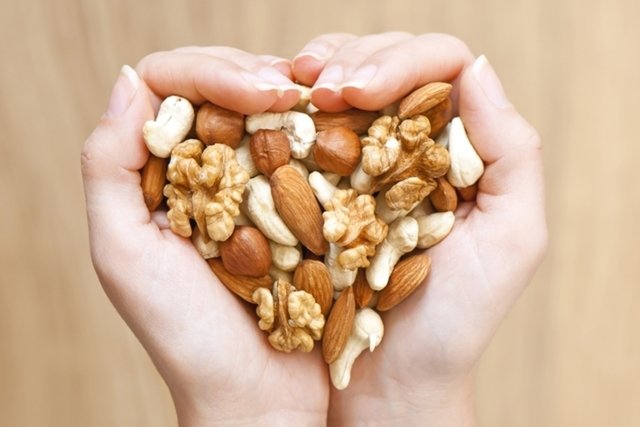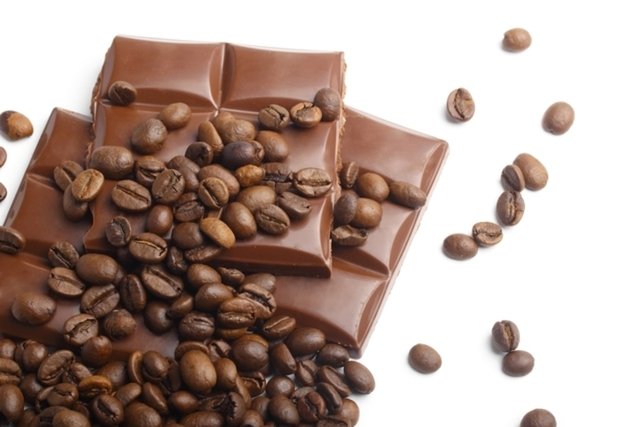Insomnia is a health problem that affects many people and can be influenced by diet, as there are some foods that are stimulants and that favor this condition, such as pepper and caffeine, for example.
Furthermore, there are other foods that help combat insomnia, such as nuts, which are a good source of melatonin, a hormone that is produced in the body and is responsible for improving sleep quality. These foods must be included in the diet and eaten daily to form part of the best sleep treatment recommended by your doctor.

Foods that promote sleep
The main foods that help combat insomnia are those that contain:
1. Tryptophan
Tryptophan favors the production of melatonin in the body, which in addition to regulating sleep is an antioxidant, has neuroprotective effects, anti-inflammatory effects, improves the immune system, among others. Furthermore, it helps to produce serotonin, inducing calmness and drowsiness.
Foods rich in tryptophan are turkey, milk, beef, oats, salmon, tomatoes, white cheese, kiwi, walnuts, almonds, rice milk and honey.
2. Magnesium
Magnesium can help improve sleep quality, as it reduces levels of cortisol, a stress-related hormone that is detrimental to sleep. Additionally, it increases GABA, a neurotransmitter that promotes relaxation and sleep.
Foods rich in this mineral are garlic, bananas, walnuts, almonds, prunes, bread, whole grain beans and rice, salmon and spinach.
3. Foods rich in omega-3 and vitamin D
Foods rich in omega-3 and vitamin D are essential for the production of serotonin, a brain chemical that improves sleep. Foods rich in vitamin D are cod liver oil, salmon, milk, eggs, meat, sardines and butter.
Foods rich in omega-3 are flaxseed oil, salmon, sardines, flaxseeds and chia seeds, tuna, herring and walnuts.
4. Calcium
A lack of calcium in the body may be related to insomnia, as it is an essential mineral to ensure the production of serotonin. Therefore, it is recommended to increase your intake of foods rich in calcium, such as natural yogurt and milk, especially before bed. One tip is to drink 1 glass of hot milk before bed.
Foods that can cause insomnia

People who suffer from insomnia should avoid foods that stimulate the central nervous system, as they could make it difficult to sleep, including: coffee, energy drinks, soft drinks, black tea, mate tea, green tea, ginger, pepper, chocolate and açaí .
These foods should be avoided after 4 pm, as this gives the brain more time to receive the electrical impulses necessary to regulate sleep and, thus, guarantee a good night’s sleep.
Furthermore, it is important to avoid fried foods, foods with a lot of fat, refined sugars or a lot of food close to bedtime, as these can cause indigestion and affect sleep.
How should the diet be
It is important to include permitted foods in your daily diet, avoiding stimulants in the late afternoon and at night. In addition, you should also avoid eating dinner too close to bedtime and not watching television while eating. It may even be interesting to have hot soup during dinner to encourage sleep.
It is also important to maintain a regular schedule for both meals and bedtime and waking up. It is also possible to drink apple tea before bed, as it has properties that help calm, promote sleep and reduce insomnia, thanks to the fact that it contains apigenin, an antioxidant that acts on sleep receptors in the brain.
Menu to combat insomnia
The following table provides an example of a menu to combat insomnia.
The quantities included in this menu vary according to age, sex, physical activity and there may or may not be any associated disease, so the ideal is to seek guidance from a nutritionist so that a complete assessment can be carried out and the most appropriate nutritional plan can be calculated. according to the person’s needs.
Check out some other tips on how to eat during insomnia:

Sign up for our newsletter and stay up to date with exclusive news
that can transform your routine!
Warning: Undefined array key "title" in /home/storelat/public_html/wp-content/plugins/link-whisper-premium/templates/frontend/related-posts.php on line 12
Warning: Undefined array key "title_tag" in /home/storelat/public_html/wp-content/plugins/link-whisper-premium/templates/frontend/related-posts.php on line 13




